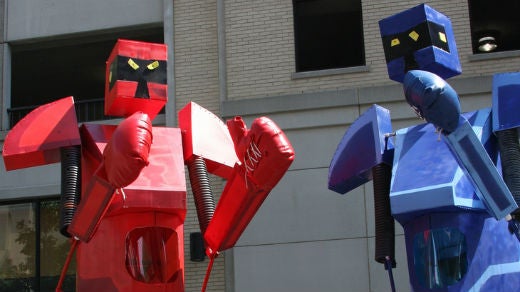SPARKcon is an interdisciplinary creativity, art, and design festival produced by the non-profit creativity incubator, Visual Art Exchange (VAE). SPARKcon 2013 will be the 8th annual event and will be held September 12-15 in downtown Raleigh, NC. See an overview of the SPARKcon festival in this video. Read an interview with the founder of SPARKcon, Aly Khalifa, in this article.
My first encounter with SPARKcon was shortly after I moved to Raleigh when I saw someone wearing the T-shirt. Intrigued solely by the name, a quick web search told me that I had just missed the event, held each September in downtown Raleigh, and a great opportunity to get to know the local creative community.
SPARKcon is described as a "creative potluck" with an "open source, for the people, by the people" approach, showcasing "the creative hub of the South."
I had to wait a year to witness my first SPARKcon festival, but my relationship with it has progressed in a manner that I’ve heard many others describe in a similar way:
Year 1: Attend the festival as a visitor. Inevitably find a connection between what you’re already doing and what you see at SPARKcon.
Year 2: Participate as an artist/performer/speaker/maker in response to an open call for talent. Realize that the planning process is transparent and anyone can help organize a SPARK.
Year 3: Show up to a SPARKcon meeting and end up planning your own event (or even creating your own, brand new SPARK).
Organizing a SPARK
SPARKcon is comprised of multiple areas of interest, referred to as SPARKs. Some examples are musicSPARK, artSPARK, circusSPARK, and fashionSPARK. Each SPARK is independently organized by volunteers who are typically already embedded in a local community of interest.
I am a primary organizer for the geekSPARK group. When the SPARKcon festival starts in downtown Raleigh on September 12 this year, we will be responsible for:
- 10 events
- 50+ talented artists, makers, teachers, coders, designers, and game-masters
- 250+ scheduled robot-boxers, assassins, monsters, chasers, learners, and pint-sized STEAMers
- 400 boxes, 50 buildings, and 14 cubic yards of destructible city-scape
The planning of an individual SPARK begins exactly one year in advance, as organizers and talent are already being inspired by what they’ve seen and the conversations they’ve had. That’s how long we’ve been talking about letting visitors dress up in a monster suit and destroy a scale model of the city of Raleigh, complete with computer vision that determines the appropriate sound effects.
Open to anyone
The first main, overall SPARKcon meeting is held in January of each year. These monthly general meetings are open to absolutely anyone and everyone. High level brainstorming and goal-setting for the festival as a whole happens in these early meetings, and newcomers are introduced to returning SPARK organizers based on their interests. Some new SPARKs are formed, while some are put on hold until a willing organizer can be found. The various SPARKs soon decide their own regular meeting times and post them on a public Google Calendar as well as to the SPARKcon website. Then communication begins through existing or new mailing lists.
Throughout the year and within each SPARK, many ideas are born. Ultimately, the ones that live until September are those that find a passionate person willing to stand behind them and nurture them with further planning. Also, each SPARK is assigned a representative from the main organizing team, referred to as a Bobblehead. The Bobblehead provides helpful planning guidance, but their primary purpose is to nod their head up and down and say "YES! ...IF you can make it happen."
Every idea is welcome and encouraged as long as a there is a champion for it who can promise to follow through. You say you want to project a video on the side of a 10-story building? Great!
- Can you raise thousands of dollars for a high-end projection system?
- Can you secure the approval of the City and the property owner?
- Can you finish your animation in time for everyone to provide feedback?
If not, can you build a team to make it happen?
Sometimes there are great ideas but the right person can’t be found within the existing group of organizers to make it happen. So, we go seeking that person out directly. This year with geekSPARK, we knew we wanted to put on a showcase for local independent game developers. By researching and contacting local groups, we found an enthusiastic leader and an instant connection to an already vibrant indie game development scene: the local IGDA chapter and university participants in the Global Game Jam.
During the planning process, many individual SPARK organizers are learning to handle event planning, fundraising, budgeting, and other related skills for the first time. SPARKcon’s main organizers and Bobbleheads act as mentors to the individual SPARKs in order to grow these skills. To this end, the SPARKcon website contains an Organizer’s Corner with resources and guides for SPARK organizers. Templates for budgets, suggested sponsorship benefits, and guides for marketing events are all examples of the types of support provided.
Transparency and the flow of information
SPARKcon encourages transparency within and across SPARKs by making planning documents publicly accessible, holding publicly accessible planning meetings, and publishing meeting notes. The goal is to lower barriers to entry for those who want to become involved and also to share lessons learned with other groups.
SPARKcon serves as a central source for best practices as they relate to organizing events in the downtown Raleigh footprint and in building creative teams. The skills that organizers learn through planning and leading a SPARKcon event are readily transferable to other areas of their professional and creative lives.
Failures as opportunities
There are always some challenges that pop up the day of an event at SPARKcon. The computer vision system doesn’t play nice with the shifting sunlight, the WiFi signal is unreliable, or a backup rain location doesn’t have enough crowd capacity. Whether a minor setback or a complete failure, these risks are always welcome because for every new idea that fails, many more emerge that are wildly successful. Failures are seen as an opportunity to learn and refocus attention on those ideas that are working and are popular. The most successful ideas turn into annual events themselves, growing larger with every SPARKcon and creating entirely new communities in the process.
SPARKcon’s greatest contribution to the Triangle area is not simply a multi-day arts festival. Beyond that, it is a catalyst for continued growth in the local creative community, and it empowers local creative leaders to transform communities of interest into communities of action through the process of the open source way.




Comments are closed.